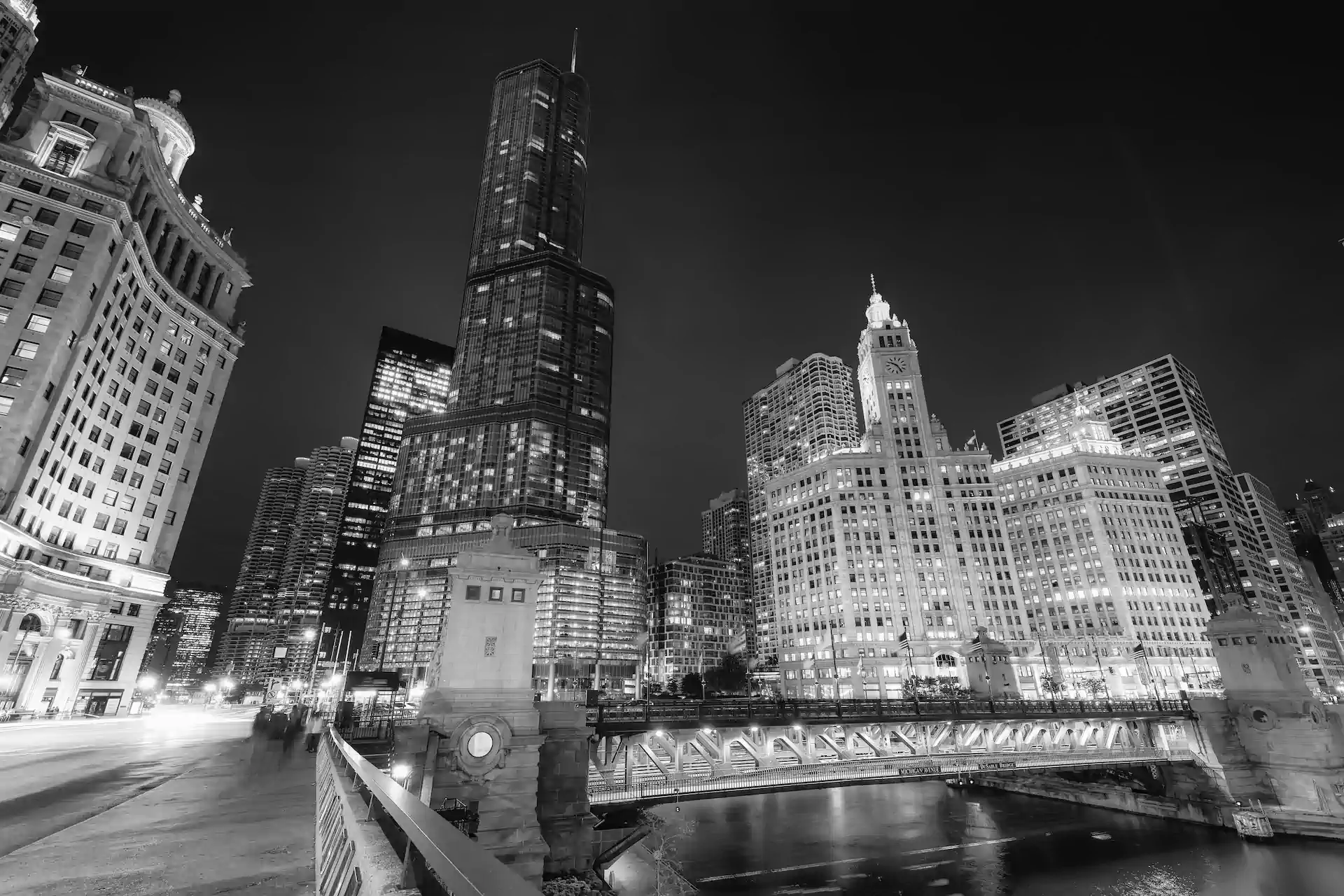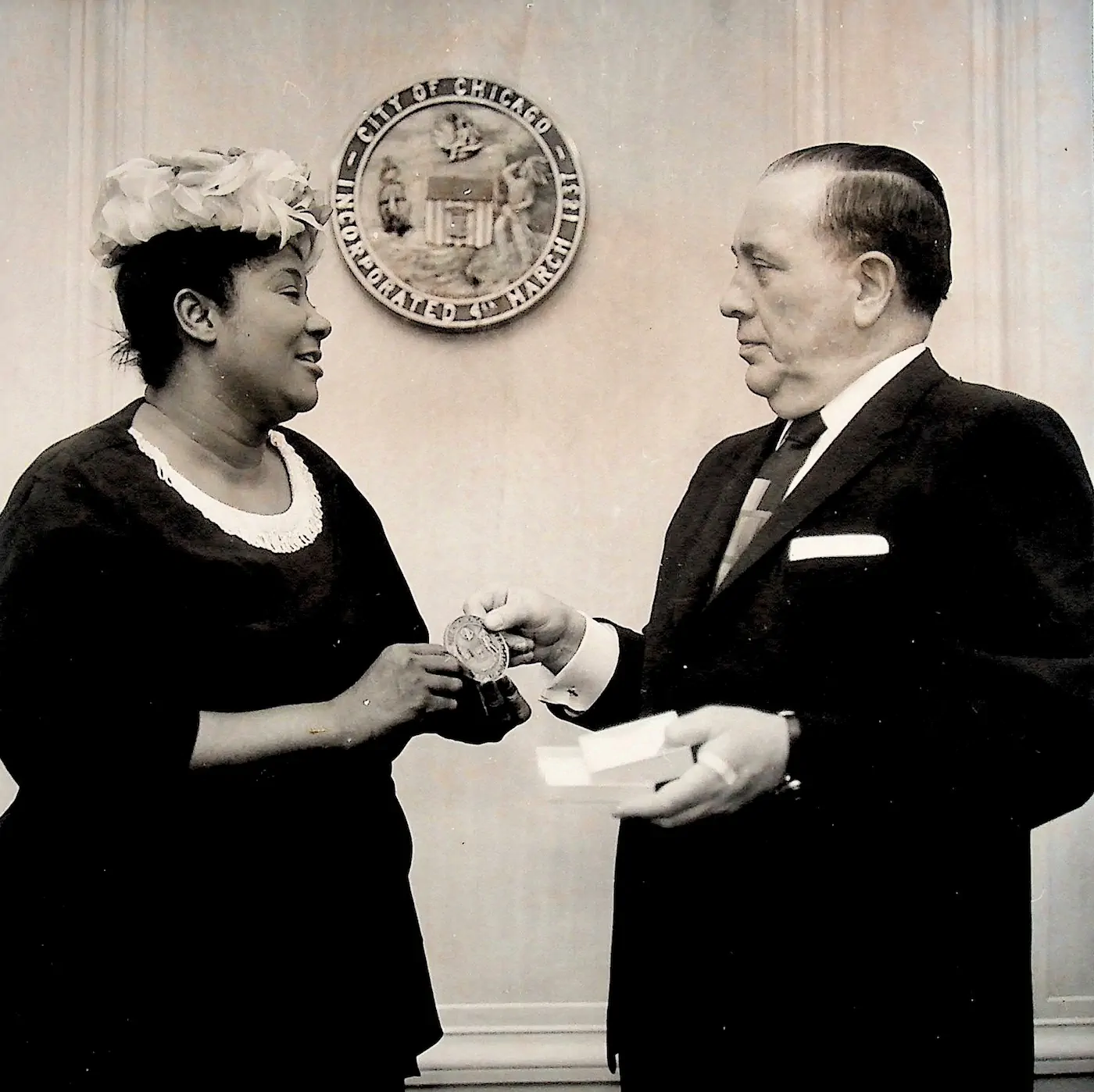
© Lucky-Photographer/Alamy
The birthplace of gospel music
Chicago, a city steeped in history and culture, played an indispensable role in the emergence and development of gospel music. So much so that author Robert M. Marovich, in his book "A City Called Heaven," refers to Chicago as the true birthplace of gospel music. This metropolis was not only a center for musical innovation, but also the stage for the rise of one of the greatest gospel icons of all time: Mahalia Jackson.
Chicago's defining influence on gospel music
Chicago's influence on gospel music is profound and can be seen in several historical milestones:
Birth of modern gospel
Six decisive turning points in Chicago laid the foundation for modern gospel music. These include the first known commercial recording that combined typical gospel techniques: Arizona Drane's "My Soul Is a Witness for My Lord" from 1926.
The first gospel choir
A key moment was the founding of the first modern gospel choir by Thomas A. Dorsey and Theodore R. Frye at Ebenezer Baptist Church in December 1931. This marked the start of a movement that would soon sweep the entire city.
Cross-border distribution
The gospel music developed in Chicago was not limited to denominational boundaries. It spread through sheet music, recordings, radio, and television, crossing racial and cultural barriers and reaching a wider audience.
Center of the gospel scene
In the late 1930s, Chicago established itself as the undisputed center for the publication and performance of gospel music. Nearly every black church in the city had a gospel choir, underscoring the omnipresence of this musical form.
Economic driver
The gospel music industry (not a nice term!) emerged in Chicago out of the entrepreneurial necessity of African American migrants. Given limited employment opportunities, gospel music offered artists, songwriters, publishers, radio stations, and pastors a way to make a living.
Growth and far-reaching influence
In the 1950s, Chicago further consolidated its leading position in gospel music: a stronghold for publishers and artists: most of the major gospel publishers and nationally renowned gospel artists were based in Chicago, making the city the hub of the industry.
Radio as a multiplier
Gospel programs on the radio, which broadcast church services almost hourly on Sundays, contributed significantly to the spread of the music and made it accessible to an even wider audience.
Television presence
The city was also the origin of groundbreaking television programs such as "TV Gospel Time" and "Jubilee Showcase." The latter was Chicago's longest-running television program for gospel music, allowing viewers nationwide to experience gospel performances live.
Mahalia and Mayor Richard J. Daley
A complex alliance
The relationship between gospel icon Mahalia Jackson and longtime Chicago mayor Richard J. Daley is a fascinating, multifaceted chapter in the history of the civil rights movement and the city of Chicago. It was a partnership based on mutual respect, political calculation, and genuine affection. At first glance, the gospel singer from the South Side and the powerful white mayor of the Democratic Party seemed like an unlikely duo. But their relationship was marked by a complexity that went far beyond superficial friendships.
Daley saw Mahalia Jackson not only as a cultural celebrity, but also as an important bridge to the African American community, whose voices were crucial to his political success. He recognized her importance and knew how to use it to his advantage. For Mahalia Jackson, the relationship with Daley offered a unique opportunity to use the power at her disposal to promote the concerns of the Black community and protect herself.
Mahalia Jackson was more than just a singer—she was Daley's "unofficial observer" and a trusted advisor. She reported to him on the mood and critical situations in the South Side, which helped Daley feel the pulse of the city and identify political tensions early on. In return, Daley supported her wherever he could. He protected her home after she moved to a predominantly white neighborhood and was subjected to racist threats. Daley dispatched police officers and asked the FBI to investigate, which put an end to the threats. He also supported her business ventures, such as the Mahalia Jackson Chicken Diners, and offered to help her establish a gospel singing school, which was very close to her heart.
The dynamic nature of their relationship was particularly evident in the context of the civil rights movement. Although Daley distrusted King privately, he acted on Jackson's intervention. It was she who called him and convinced Daley to offer King a platform in Chicago. Despite his personal reservations, Daley welcomed King with a smile and ensured he received a grand reception. Mahalia was aware of Daley's political calculations and warned King not to describe him as a "cunning politician."
But Mahalia did not shy away from confronting Daley personally. During the riots of 1968, she called on him to "unleash" the city. Daley responded with a $5,000 donation to her charity program. This episode shows that their relationship was not based solely on political expediency, but also on a mutual understanding that Jackson could use her moral authority to influence Daley.
The friendship between the two was marked by deep mutual respect. Daley was visibly proud of Mahalia Jackson and honored her on various occasions, such as at a benefit dinner where he publicly expressed his admiration. Daley sent her flowers to the hospital and conducted her funeral service after she passed away in 1972. As a sign of his appreciation, he declared the day of her death an official day of mourning in Chicago and called her "Chicago's number one celebrity."
The relationship between Mahalia Jackson and Mayor Richard J. Daley (1902–1976) was a complicated but ultimately deeply productive partnership. It shows how Jackson strategically used her popularity and influence to protect herself and her community, while Daley found a valuable ally who helped him navigate Chicago's complicated political landscape. Their connection was a powerful example of how music, faith, and politics were intertwined during one of the most turbulent periods in American history. Mahalia's longtime assistant and secretary, Celestine "Polly" Fletcher, later worked as secretary for Mayor Daley in Chicago.
April 24, 1961. Mahalia Jackson receives a medal of honor from Mayor Richard J. Daley.

© Ralph Walters, Chicago Sun-Times
Chicago's influence on Mahalia Jackson's career
Mahalia Jackson's journey from a young woman in New Orleans to a world-famous singer is inextricably linked to Chicago!
Arrival and first steps
Mahalia Jackson moved to Chicago at the end of November 1931 at the age of 20. With dreams of becoming a professional—originally as a teacher or nurse—she initially found work as a domestic servant and in a date factory before working full-time as a housekeeper. She immediately joined the choir of Greater Salem Baptist Church and quickly became a soloist in a quintet, which she also led through churches in the city and beyond.
The Johnson Singers
Mahalia became part of the Johnson Singers, often considered the first professional gospel group. Their theatricality and progressive vocal style thrilled audiences. Despite initial criticism from some conservative Chicago pastors who found her emotional and "bluesy" style "blasphemous," she persisted with her unique expression. Her apartment and beauty salon in Chicago became a popular gathering place for gospel musicians and singers.
Collaboration with Thomas A. Dorsey
In Chicago, Mahalia Jackson met legendary gospel composer Thomas A. Dorsey, the "father of gospel music." He became her mentor and companion, and she helped him promote his newly written gospel songs by singing them on street corners and later touring with him.
Breakthrough and national recognition
She made her first commercial recordings for Decca in Chicago in 1937. Her real breakthrough came in early 1948 with her recording of "Move On Up a Little Higher" for Apollo Records. This recording, made in Chicago, was reportedly the first million-seller for black gospel and catapulted Mahalia Jackson to national fame. Chicago radio host Studs Terkel played a crucial role in her discovery and popularization by playing her records and interviewing her on his radio show, bringing her to prominence beyond the black church community. Following her signing with CBS/Columbia Records in 1954, Chicago station WBBM-TV launched the local program "Mahalia Jackson Sings." The public debut and promotion of her national CBS radio show also took place in Chicago.
A lasting legacy in Chicago
Although she became internationally famous, Mahalia Jackson remained active in local Chicago churches. She also supported the Mahalia Jackson Scholarship Foundation to promote aspiring music students. Her dream was to build a non-denominational temple in Chicago where children could learn music. After her death on January 27, 1972, her coffin was laid in state in Chicago. Then-Mayor Richard Daley, a close friend and supporter, declared an official day of mourning in the city, a testament to the deep bond between Mahalia Jackson and the city that made her a legend.
Chicago's influence on gospel music and Mahalia Jackson's career is undeniable. The city provided the fertile environment for the development of a new musical genre and the rise of a unique voice that touched millions of people. Chicago remains a beacon in the history of gospel music and an important place in Mahalia Jackson's legacy.
©Thilo Plaesser